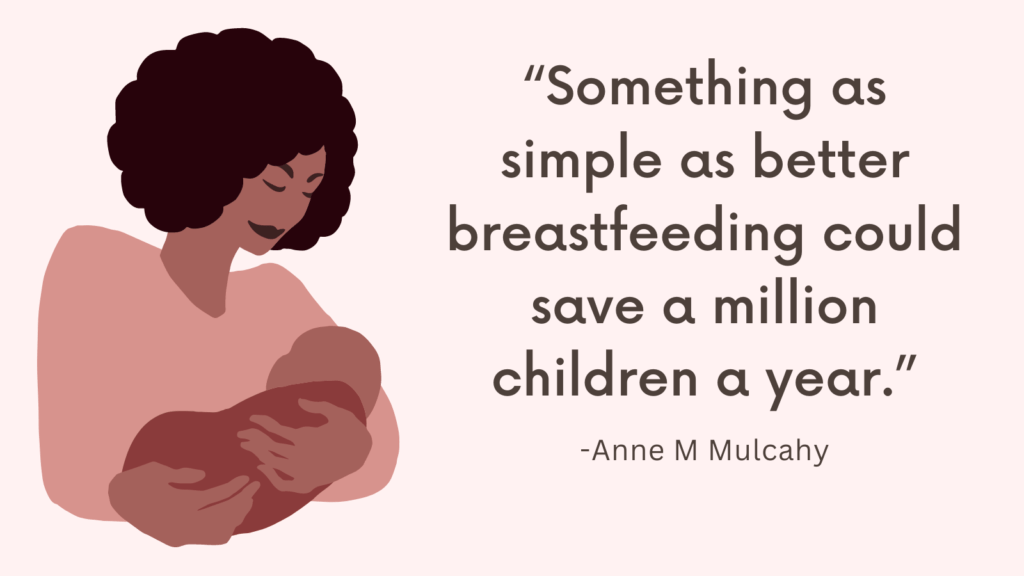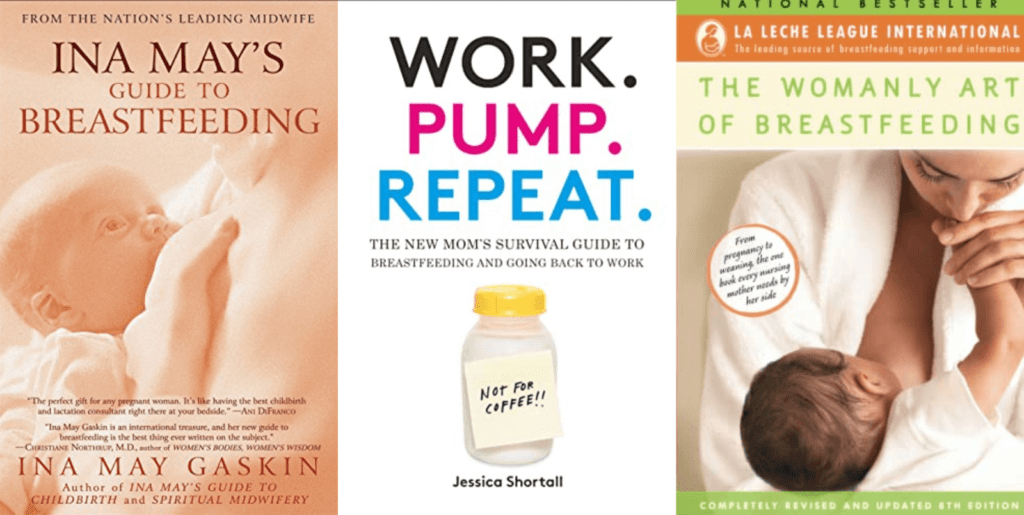This post will discuss when breastfeeding gets easier and offer tips to help new mothers navigate the process.
Why Breastfeeding Is Important?
Breast feeding is important for the following reasons:
1. Provides essential nutrients: Breast milk provides all the necessary nutrients that a baby needs to grow and develop properly. It contains proteins, fats, vitamins, and minerals in the right amounts for the baby’s optimal growth. (source)
2. Boosts immunity: Breast milk also contains antibodies that help protect the baby from infections and diseases, especially in the first few months of life when the baby’s immune system is not fully developed. (source)
3. Promotes bonding: Breast feeding promotes bonding between the mother and the baby. The skin-to-skin contact, cuddling, and eye contact during breastfeeding create a close emotional bond. (source)
4. Reduces the risk of childhood obesity: Breast feeding has been linked to a lower risk of childhood obesity, as breast milk helps regulate the baby’s appetite and helps them develop healthy eating habits. (source)
5. May reduce the risk of certain illnesses: Studies suggest that breastfeeding may reduce the risk of certain illnesses in both the mother and the baby, such as breast cancer, ovarian cancer, and type 2 diabetes in the mother, and ear infections, respiratory infections, and asthma in the baby. (source)
6. Cost-effective: Breast feeding is a natural and cost-effective way of feeding the baby. It does not require any special equipment or formula and does not have the same financial burden as formula feeding.
Overall, breastfeeding is an important part of a baby’s development and has numerous benefits for both the baby and the mother.
Related: 10 Tips For Successful Breastfeeding
When Does Breastfeeding Get Easier?
The First Few Weeks: Learning Curve
Breastfeeding is a learned skill for both mother and baby, and it can take time to establish a comfortable and effective breastfeeding routine.
The first few weeks can be the most difficult for new mothers.
They are still learning how to position the baby, get a good latch, and build up their milk supply.
Common challenges include sore nipples, engorgement, and milk leaking.
It is important for new mothers to seek support from healthcare professionals, lactation consultants, and other breastfeeding mothers.
With patience, perseverance, and support, most mothers are able to successfully breast feed their babies and enjoy the many benefits of breastfeeding.
Related: How To Combine Breastfeeding And Pumping?
The Second Month: Signs of Improvement
Around the second month, many mothers start to see improvements in their breastfeeding journey.
Babies become more efficient at nursing, allowing for shorter feeding sessions.
Mothers may also notice a decrease in their milk leakage, and their breasts start to feel less engorged.
They may find that breastfeeding feels more comfortable and less painful than it did in the early days.
However, some mothers may still experience occasional issues such as clogged ducts or mastitis (breast infection).
Related: Top 8 Breast Pumping Tips For New Moms
The Third Month: Smooth Sailing?
By the third month, many mothers find that breastfeeding has become much easier.
Babies have established a routine, and milk supply have regulated to meet the baby’s needs.
Common concerns such as soreness and leakage are likely to have resolved.
However, mothers should still continue to offer frequent feedings to ensure that the baby is getting enough nutrition.
One thing to keep in mind during this period is that babies may start to become distracted during feedings due to their growing awareness of the world around them. If this happens, finding a quiet, calm environment for feedings can be helpful.
Overall, the third month of breastfeeding can be a relatively smooth and enjoyable experience for both mother and baby.
Remember, every mother-baby pair is unique so there is no one-size-fits-all approach to breastfeeding.
With patience, persistence, and some guidance, you and your baby can both learn to enjoy the benefits of breastfeeding.
Related: How To Increase Milk Supply During Period?
5 Tips For Making Breastfeeding Easier
#1. Educate Yourself About Breastfeeding
Here are some ways you can educate yourself about breastfeeding:
1. Attend a breastfeeding class: Many hospitals and birthing centers offer classes on breastfeeding. These classes provide information on the benefits of breastfeeding, how to get started, common challenges and solutions, and more.
2. Meet with a lactation consultant: A lactation consultant is a professional who specializes in breastfeeding. They can help you with any questions or issues you may have, such as latching problems, nipple pain, or low milk supply.
3. Read books on breastfeeding: There are many books available on breastfeeding that can provide helpful information and tips.
Related: Best 10 Breastfeeding Books
4. Join a breastfeeding support group: Many communities have breastfeeding support groups where you can connect with other nursing mothers, share experiences, and ask questions.
#2. Get Into a Comfortable Position and Relax
Find a quiet space, sit on a comfortable chair or sofa with pillows to support your back and arms.
Hold your baby close to your body. Your baby’s head should be in line with their body, not twisted or turned.
Take deep breaths and relax your shoulders as you breastfeed. This can help stimulate let down (a reflex is that makes breastmilk flow) and create a more relaxed feeding experience for both you and your baby.
Offer both breasts at each feeding. Let your baby nurse until they seem full or satisfied on one side and then offer the other breast.
Related: Breastfeeding Resources (Information, Apps, Books, Podcasts)
#3. Stay Hydrated
Drink plenty of water and other fluids to stay hydrated. This will help ensure that your milk supply remains adequate.
Aim to drink at least 16 cups (128 ounces) of water per day. (source)
If you feel thirsty, drink more water. Your body knows best when it needs hydration.
Having a water bottle within reach can be a helpful reminder to drink water throughout the day.
Also, foods like water melon, cucumbers, celery, and berries have high water content and can help you stay hydrated.
Avoid or limit caffeine and alcohol as they can dehydrate you.
Related: Best 10 Postpartum Books
#4. Address Breastfeeding Challenges
Yes, sore nipples, engorgement, and milk leaking are common challenges that many mothers experience while breastfeeding.
Here are some tips that may help:
1. Sore nipples: Make sure your baby is latching on correctly, with their mouth covering a large portion of the areola. Use a breastfeeding cream or a bit of breast milk to soothe and moisturize your nipples.
2. Engorgement: This happens when your breasts become overly full and uncomfortable. Try expressing a little milk before feeding your baby to soften the breast, or try using a warm compress or taking a warm shower before feeding.
3. Milk Leaking: You can use nursing pads to absorb any excess milk that leaks out during breastfeeding. Wear a supportive bra to prevent your breasts from being too heavy and causing more leaking.
Related: 10 Best Books For New Moms
#5. Seek Help If Needed
If you are struggling with breastfeeding, seek help from a lactation consultant, your doctor, or a breastfeeding support group.
They can offer guidance to help improve your breastfeeding experience.
Remember, breastfeeding is a learning process for both you and your baby, so be patient and take the time to figure out what works best for you and your little one.
Related: Best 10 Books For Working Moms
9 Things Not To Say To A New Breastfeeding Mother
1. “You should just give up and switch to formula.”
2. “Breastfeeding is easy; I don’t know why you’re having so much trouble.”
3. “You’re still breastfeeding? Isn’t your baby too old for that?”
4. “Why don’t you pump and let someone else feed the baby?”
5. “Breastfeeding is going to ruin your boobs.”
6. “It’s time to wean the baby; you’ve breastfed for long enough.”
7. “You’re always going to be attached to your baby if you keep breastfeeding.”
8. “You’re going to spoil your baby by breastfeeding on demand.”
9. “You’re making a big deal out of nothing; just give the baby a bottle.”
Conclusion
Breastfeeding can be challenging, but it does get easier with time.
Try to be patient and persistent, and seek support when needed.
Ultimately, the benefits of breastfeeding for both mother and baby make it well worth the effort.




